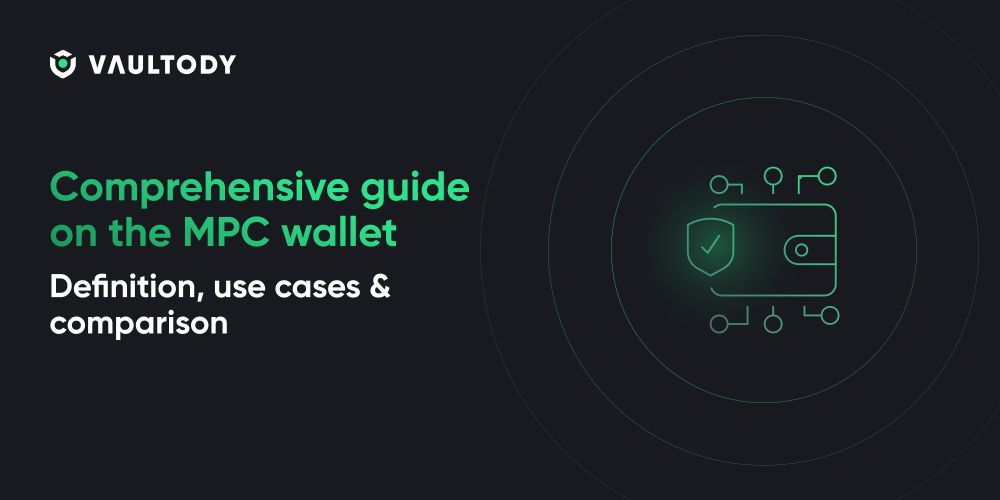The crypto industry is one of the youngest business sectors. Being at its early days, there are certain challenges that have been at the forefront of businesses - protecting their assets, as the days of becoming a victim of hack attacks are still not gone. The internet space is swamped with information in regards to crypto thefts, compromised wallets security, digital assets losses and others. The risk of losing your digital assets used to be very high in the past, but there are available tools and mechanisms that can drastically reduce and even completely eliminate this risk.
The good news is that there is an evolution in technologies which are making an enormous leap in terms of security and users` protection. This is exactly where the multi-party computation (MPC) wallet stands, as it is the ultimate wallet type guaranteeing you the highest security and privacy level. The MPC is now among the preferred transaction signing systems for a wide range of organizations.
What is MPC?
MPC is powered by the concept of eliminating single private keys in order to provide ultimate security and remove the single point of failure. In order to attain this, the MPC technology requires multiple parties to take part in the wallet management. This is done by splitting the digital signature (also referred as to “private key”) into different fragments (also known as key shards). Key shards are distributed in multiple software and hardware secured nodes which are owned by Vaultody by default, or can be owned by the client's organization.
In order for Team members to approve/reject certain transactions, all key shards which are stored securely by Vaultody servers, or kept on servers to which the client only has access to them. This is where MPC shines and eliminates not only external to an organization threats, but also internal unethical activities and risks.
Application of An MPC Wallet Into Different Business Settings
MPC Wallets may have different use cases and applications in various organizational settings which we will discuss in parallel with the MPC advantages.
Working with high value transactions: MPC wallets are a good organizational fit in cases in which companies are looking to create and broadcast transactions of high value. This is due to the distribution of cryptographic keys among the multiple members assigned to a wallet/vault. None of the transactions will be broadcast unless all members approve the request. Moreover, in Vaultody you can operate with your vault with a two-level approval mechanism, allowing you to create your own rules.
Better flexibility in payments - the multi-party technology allows different members of your team to access the wallet to manage and transfer funds. It is of utmost importance to emphasize that it is only the account owner that approves how flexible their team can be, and who can do what with the funds, depending on the role that they have been assigned.
Completing multi-chain transactions: It is very rare for organizations to limit their incoming or outgoing transactions to using just one or two cryptocurrencies. The MPC wallets are making the support of multiple blockchains and all underlying assets that run on each of them an easy task with its excellent protocol adaptability. New coins and tokens can easily be supported.
Preserving your privacy: Unlike most traditional wallets, the MPC powered wallet is a combination of unmatchable security and privacy. The multi-party technology allows execution of transactions without revealing their inputs and outputs to each other. Vaultody also employs different technological and cryptographic techniques to ensure the privacy of our customers. Additional control over privacy is granted to the account owner, who decides how and to what extent their privacy will be kept.
Cost reduction: MPC wallets can significantly reduce the organizational costs which are going towards covering network fees. Vaultody solutions are offering even higher reductions than what the ordinary MPC wallet can provide. With our innovative Smart Vaults, our clients can save up to 50% on a single transaction, or over the unbeatable 90% reduction on batch transactions. For batch transactions there will be only one transaction fees payment that will be incurred from our Gas Tanker address.
Time is money in business: This cannot be more valid when it comes to organizations, as every second could be associated with additional financial burden. The MPC wallet, and more specifically the Vaultody MPC solutions are offering creation of batch transactions, allowing you to make payments to as many addresses as you desire at the same time, without the need to await confirmation on each transaction before making a new one. Picture the time-consuming task of manually executing transactions for 100 different addresses – that tedious process is now a thing of the past.
Versatility and interoperability: MPC wallets can facilitate cross-chain interoperability, supporting all digital assets that run on a specific blockchain network. This is valid even for collectable assets in gaming, NFTs, tokens and other digital assets. The versatility that the MPC wallets provides allows organizations to quickly adapt and make or receive transactions across various blockchains, which results in better funds management, with control exercised by multiple parties.
MPC vs Multi-Sig
Multi-sig is the type of wallet that has the most similarities to the MPC wallet. They both require multiple parties to participate in the approval process of a transaction in order to authorize it. Both are eliminating the single point of failure through a distribution of responsibilities across multiple parties. And they both provide increased protection, customization, higher complexity than single-signature wallets, but improved security and privacy.
What is dividing the MPC from the Multi-Sig is the private key split that is available in MPC wallets between the wallets/vaults participants. The key is splitted into key shards, which we discussed above, whereas in Multi-sig each participant has their own private keys. What makes the MPC even more secure in a sense of securing the private keys is the fact that key shards might be dynamic and may be divided between different devices and servers.
The multi-sig wallet is declining in popularity due to other constraints that it provides to its customers, such as the limitations on protocol adaptability and interoperability. Only a few protocols are supported, with new blockchain networks being difficult for integration, which limits the organizational operation with different and newly launched assets. This is in contrast with the MPC technology, which is making the integration of different chains very easy for completion.
Moreover, multi-sig wallets are inconvenient when it comes to operating with higher amounts of digital assets. It is difficult to adjust the process of accessing and transferring assets, especially when comparing it head to head with MPC. In addition, users of multi-sig wallets must pay much higher transaction fees compared to regular MPC wallets, and several times higher fees when compared with Vaultody MPC vaults. The reason why multi-sig transaction fees are so high is that transaction signing is happening on-chain, which makes the transaction size higher. The higher the transaction size, the higher the space that is occupied in a block, which results in more fees paid to the blockchain miners for processing the transaction.









 Copy link
Copy link